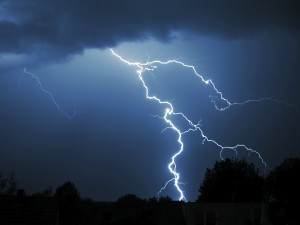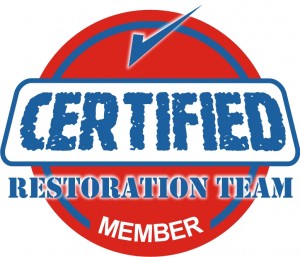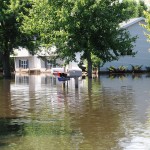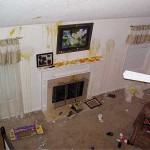Georgia Lightning Awareness Week: June 19-25, 2011
 Tuesday, May 17, 2011 at 04:17PM
Tuesday, May 17, 2011 at 04:17PM  Lightning is one of the leading causes of weather deaths in the United States. From 1995 to 2010, lightning caused 26 deaths in Georgia. Most lightning deaths occur in the summer months - usually in the afternoon and evening hours. Also, most deaths occur when people are caught outside during a storm.
Lightning is one of the leading causes of weather deaths in the United States. From 1995 to 2010, lightning caused 26 deaths in Georgia. Most lightning deaths occur in the summer months - usually in the afternoon and evening hours. Also, most deaths occur when people are caught outside during a storm.
Lightning results from the buildup and release of electrical energy between positive and negative charges between the earth and a thunderstorm. A single lightning bolt can be as hot as 50,000 degrees Fahrenheit - hotter even than the surface of the sun. This rapid heating and cooling of the air creates a shock wave which we hear as thunder. Lightning will usually strike the highest object in area. This includes trees, antennas, a boat on a lake, or a person standing in a field.
So, what should you do to protect yourself?
 Champion Construction Systems,
Champion Construction Systems,  Community News,
Community News,  Current Events,
Current Events,  Education,
Education,  Emergency Planning,
Emergency Planning,  Fire Damage,
Fire Damage,  Georgia,
Georgia,  Insurance,
Insurance,  Storm Damage,
Storm Damage,  Water Damage,
Water Damage,  atlanta,
atlanta,  atlanta ga,
atlanta ga,  champion construction,
champion construction,  disaster planning,
disaster planning,  disaster preparedness,
disaster preparedness,  georgia lightning awareness,
georgia lightning awareness,  georgia lightning awareness week,
georgia lightning awareness week,  lightning safety,
lightning safety,  lightning safety tips,
lightning safety tips,  newnan ga,
newnan ga,  north atlanta,
north atlanta,  sharpsburg
sharpsburg  Email Article
Email Article Champion Is Now A Member of Certified Restoration Team!
 Monday, May 16, 2011 at 12:24PM
Monday, May 16, 2011 at 12:24PM  Champion is excited to announce that we are now a member of Certified Restoration Team!
Champion is excited to announce that we are now a member of Certified Restoration Team!
What Is Certified Restoration Team?
Certified Restoration Team is a group of contractors that have all been certified to properly restore properties after a water or fire loss. Did you know that the vast majority of restoration contractors have never been certified and perform substandard work in homes and businesses around the country? Unfortunately those property owners don’t realize until too late that they have gotten poor quality service. This can lead to on-going damage, mold growth, bacterial amplification and a generally unhealthy structure.
You can do a lot to prevent these problems by hiring a certified firm. All of the firms that are a part of Certified Restoration Team must prove their credentials and maintain their certification through Continuing Education. You can choose a Certified Restoration Team member with confidence because they have the knowhow to fix your property right.
No Certified Restoration Team member pays to be a part of the team and they don’t pay for referrals. We work cooperatively for the advancement of our industry and the betterment of our customers. Please support our efforts by recommending CRT to your insurance agent or adjuster.
Should I buy Earthquake Insurance?
 Tuesday, April 12, 2011 at 10:33AM
Tuesday, April 12, 2011 at 10:33AM  This following information is from United Policyholders:
This following information is from United Policyholders:Prepare For Flood Season
 Thursday, February 24, 2011 at 03:01PM
Thursday, February 24, 2011 at 03:01PM  Educate Yourself
Educate Yourself
After getting flood insurance, there are several things you can do to minimize losses in your home and ensure your family's safety.
1. Safeguard your possessions.
Create a personal "flood file" containing information about all your possessions and keep it in a secure place, such as a safe deposit box or waterproof container. This file should have:
- A copy of your insurance policies with your agent's contact information.
Be Prepared for Hailstorms
 Monday, January 24, 2011 at 03:44PM
Monday, January 24, 2011 at 03:44PM
- Listen to weather updates about hail activity.
- Seek shelter immediately if you are caught outdoors - preferably not under a tree.
- Close drapes, blinds or window shades for protection
 Champion,
Champion,  Champion Construction Systems,
Champion Construction Systems,  Community News,
Community News,  Current Events,
Current Events,  Emergency Planning,
Emergency Planning,  Insurance,
Insurance,  Restoration,
Restoration,  Storm Damage,
Storm Damage,  Water Damage,
Water Damage,  atlanta,
atlanta,  atlanta ga,
atlanta ga,  champion construction,
champion construction,  customer service,
customer service,  disaster planning,
disaster planning,  disaster preparedness,
disaster preparedness,  hail damage,
hail damage,  hailstorms,
hailstorms,  newnan ga,
newnan ga,  sharpsburg,
sharpsburg,  tornado,
tornado,  tornadoes
tornadoes  Email Article
Email Article What Should I Do If My Pipes Are Frozen?
 Monday, December 27, 2010 at 10:11AM
Monday, December 27, 2010 at 10:11AM  The weatherman has warned you that a cold front is barreling its way into your local area. You go to sleep the night before with extra covers on the bed and the thermal blanket set to "high". When you awake in the morning, it takes all of your determination to crawl from between the warm covers to start your day. As you step to the sink and turn the faucet on, nothing happens. Oh no! You forgot to leave the water trickling over night. Obviously, water has frozen in the pipes. Thankfully, you look around everywhere in the house and you see no evidence of a water leak. You may assume that the only tragedy is that you'll have to go to work without a shower, but think again.
The weatherman has warned you that a cold front is barreling its way into your local area. You go to sleep the night before with extra covers on the bed and the thermal blanket set to "high". When you awake in the morning, it takes all of your determination to crawl from between the warm covers to start your day. As you step to the sink and turn the faucet on, nothing happens. Oh no! You forgot to leave the water trickling over night. Obviously, water has frozen in the pipes. Thankfully, you look around everywhere in the house and you see no evidence of a water leak. You may assume that the only tragedy is that you'll have to go to work without a shower, but think again.
My Friend/Neighbor/Relative Didn't Have To Pay Their Deductible
 Thursday, December 9, 2010 at 11:47AM
Thursday, December 9, 2010 at 11:47AM  Every once in a while our company is asked if we can "bury" a prospective client's deductible. We are often told that a previous contractor who completed repairs to the home did the work without collecting the deductible. I have no doubt that such persons are telling the truth, since such occurrences are far from rare. I also have no doubt that the deal these homeowners think they have gotten will cost them more than their deductible in the long run.
Every once in a while our company is asked if we can "bury" a prospective client's deductible. We are often told that a previous contractor who completed repairs to the home did the work without collecting the deductible. I have no doubt that such persons are telling the truth, since such occurrences are far from rare. I also have no doubt that the deal these homeowners think they have gotten will cost them more than their deductible in the long run.
P-U! Is sewage backup covered?
 Monday, December 6, 2010 at 12:51PM
Monday, December 6, 2010 at 12:51PM  The following was e-mailed to me by United Policyholders, a consumer advocate group for insureds. This is great information I thought I should share with everyone...
The following was e-mailed to me by United Policyholders, a consumer advocate group for insureds. This is great information I thought I should share with everyone...
Stinky sewage back-up and overflowing drains are a very common cause of damage to homes and businesses, especially those located in flat areas or near the bottom of slopes. Many policies now exclude coverage for the clean-up and repairs, but for a mere $20 a year you can buy a "Back-up of Sewer or Drain Endorsement" that gives you up to $10,000 in coverage. The catch? A $1,000 deductible. But hey, that's still easy math.”
Larry Banach - Construction Manager
Do I Really Have To Pay My Deductible?
 Monday, November 15, 2010 at 11:12AM
Monday, November 15, 2010 at 11:12AM  When you purchase a homeowners insurance policy, one of the decisions to be made is at what price point you want to set your deductible. The deductible is the amount you must pay personally BEFORE the insurance company steps in to cover the remainder of the loss amount. Essentially, you are self-insured up to the amount of your deductible.
When you purchase a homeowners insurance policy, one of the decisions to be made is at what price point you want to set your deductible. The deductible is the amount you must pay personally BEFORE the insurance company steps in to cover the remainder of the loss amount. Essentially, you are self-insured up to the amount of your deductible.
When you file an insurance claim, either the insurance adjuster or a contractor, such as Champion Construction, will write a repair estimate. Let's say you had a $500 deductible, and the claim total was $5,000. The insurance company would issue a check for $4,500, with you personally owing the remaining $500. So, now you have a check for $4,500 and you want to know if the contractor can repair your home for that amount ONLY, saving you $500 hard-earned dollars. The short answer is "No", but let's take a step back into history for a moment.
What To Do If Your Home Is Vandalized
 Thursday, November 4, 2010 at 04:56PM
Thursday, November 4, 2010 at 04:56PM  Carpet & Area Rug Cleaning,
Carpet & Area Rug Cleaning,  Champion,
Champion,  Champion Construction Systems,
Champion Construction Systems,  Community Service,
Community Service,  Company Information,
Company Information,  Emergency Planning,
Emergency Planning,  Insurance,
Insurance,  Restoration,
Restoration,  Water Damage,
Water Damage,  atlanta,
atlanta,  atlanta ga,
atlanta ga,  champion construction,
champion construction,  disaster,
disaster,  disaster planning,
disaster planning,  disaster preparedness,
disaster preparedness,  newnan ga,
newnan ga,  north atlanta,
north atlanta,  vandalism,
vandalism,  vandalism dos and donts,
vandalism dos and donts,  what to do if you have a vandlism,
what to do if you have a vandlism,  what to do if your home is vandalized
what to do if your home is vandalized  Email Article
Email Article 

